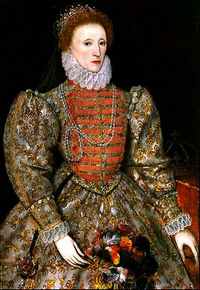 |
If Suleyamn the Magnificent had a peer among the rulers of Europe during
the Renaissance, an exemplar all the virtues that Castiglione's The
Courtier and Machiavelli's The Prince said a sovereign should
have, it was not a Renaissance man, but a Renaissance Woman, the most
successful ruler Western Europe had seen since Charlemagne, Elizabeth
the first, Queen of England. It was during her reign and with her
patronage, that British drama flowered, rooted in a tradition
of lyric and epic poetry and humanistic scholarship dating back
to the the bards who preserved the tales of Beowulf and Arthur and the
monks that saved the remnants of classical culture in their monasteries.
Her support of drama produced the climate where Kidd, Marlowe, Webster
and Shakespeare brought drama back to life as a major literary form,
as surely as the Medicis created the the milieu that produced Florentine
architecture, sculpture, and painting. Elizabeth was a product of renaissance
education, a master
of languages, a
musician, a poet,
a skilled
politician and a woman who believed that ruling
and ruling well was more important than breeding a descendant to
inherit the English Crown. She understood virtu and when fortuna
gave her the opportunity, seized it to teach Machiavelli that one might
rule in such a way as to be loved
rather than feared.
|
